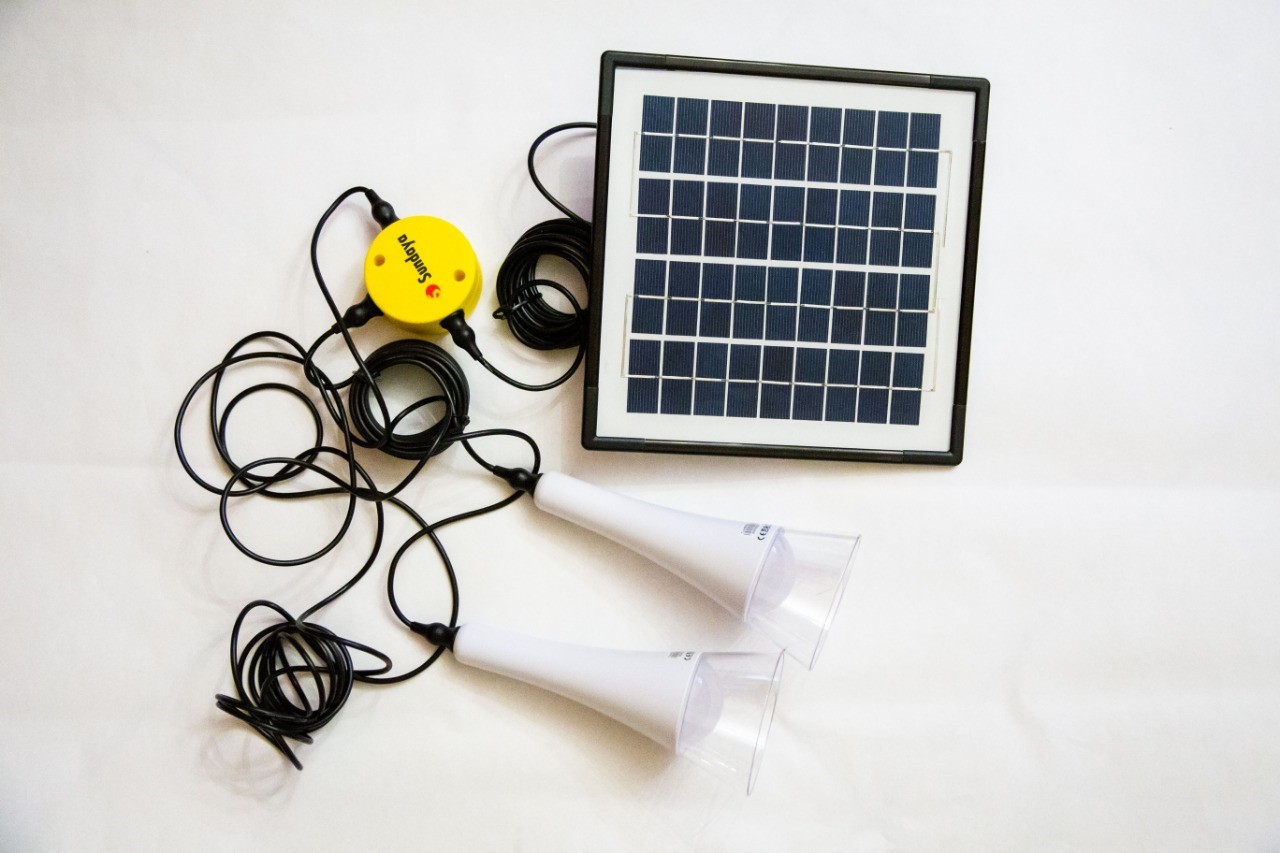As a country, we have been through a lot already but that doesn’t mean that we should sit back and sulk about it. We need to change the way that we live and be smarter about the decisions that we make. This is the reason that I choose to use solar power where ever I can.
Well, that and the fact that electricity (and fuel) – two of the major items that we rely on – is becoming expensive.
Let us not forget about the poor sick earth that is choking to death on hazardous fumes and – yes- the pollution that we often forget about. You know it is sad to see that so many things that I took for granted is not normal anymore.

How often do we see the birds chirping or enjoy the beauty of a starlit sky? Everything seems so…. Fake. Suddenly I want more. I want my children to feel the wind in their hair when they are on a swing and I want the swing to hang on a tree. I want them to feel the grass, real not synthetic, under their feet. I want them to see the lions, tigers and animals. I want my children to catch frogs and chase butterflies and I want them to be able to experience nature – naturally. I have however realised that in-order for this to happen I need to change, because changing my lifestyle may be the only way to change the world. So maybe it’s time to go green.
Solar energy creates clean, renewable power from the sun and benefits the environment. After all it makes sense to harness energy for energy right!
For a long time, I have been considering flipping the switch (moving over to solar) but to be honest, I think that I was more scared than anything else. Scared that I might make the wrong decision or one day end up sitting with no power for an entire night. Oh, the irony…

After doing a ton of research, I am now more motivated than ever to flip the switch.
Some benefits of using solar power:
- You save money in the long run – yes it might be expensive to start out but within 3 years, it will typically pay for itself.
- Saving the environment – I think sometimes we forget how we are killing our own planet slowly every single day. Fossil fuels, such as coal, oil and gasoline, add a lot of carbon dioxide into the atmosphere which can worsen global warming.
You don’t have to convert everything. I am taking take baby steps and have already invested in one room.
I am currently using the Sundaya T-Light Kit which is a solar home system that can be expanded gradually. It comes with its own solar panel, up to four bayonet lamps, connection hub (linking the lamps to the solar panel), and four cell phone adapters.
Unlike the solar lamps, this system doesn’t have a battery and allows you to put the solar panel on or next to the roof of your house outside and connect the lamps directly into the system inside.

Sundaya T-Lights offer three brightness settings – high (precision work), medium (studying/cooking) and low (socialising). The system can be expanded upon by buying additional kits and connecting these into the existing hubs, effectively allowing you to bring light into every room of your home. A full days’ charge lasts between 6 and 60 hours, depending on the setting used.
If you are still thinking about this, there are still little things you can do at home to help our beloved planet.
Why not start with Earth hour this Saturday – 30th of March. Millions across the world will turn off their lights for one hour (8:30 – 9:30PM local time) to celebrate their commitment to the planet. I know that an hour seems miniscule in light of our daily routines. Yet 1 hour of downtime is so much more than just switching off. It is rather about flipping the switch a creating awareness. It is about getting connected.

By switching off your lights for one hour, you can make a substantial difference in the energy consumption and can help reduce effect of global warming on this planet. But the important thing is the awareness factor. Earth hour has made a difference. It getting people talking about climate change. It is not sitting in darkness but making you aware of the light.
This earth hour flip the switch and change the way you live.
Competition time!
Want to win one of these awesome solar lamps?

Share this post and comment below – Let me know how you are changing the way you live and flipping the switch to solar?
This post was sponsored by Total.

30 comments
Copper scrap pricing strategy Scrap Copper recycling rates Recycled copper raw materials
Industrial copper recycling Copper scrap identification Copper scrap trade shows
Aluminium scrap revenue maximization Aluminium scrap fragmentation Scrap aluminium processing equipment
Copper scrap education and outreach Copper refining process Economic benefits of Copper scrap recycling
Scrap aluminium upgrading Aluminium recycling market intelligence Aluminium scrap collection services
Metal scrap shredding Ferrous scrap market trends Scrap iron
Ferrous material recycling news updates, Iron reclamation depot, Scrap metal remelting
Metal sorting services Scrap aluminium lifecycle assessment Aluminium scrap waste reduction
Scrap metal reclaiming and reprocessing, recycling aluminum cable, Metal repurposing services
Metal recycling industry trends Ferrous material recycling facility management Iron waste reutilization
Ferrous metal recycling industry, Iron scrap reclamation plant, Precious metal recovery
Scrap metal reprocessing and recycling Innovative technologies in aluminum scrap recycling Recycling awareness campaigns for aluminum scrap
Metal waste inventory services, Aluminum cable scrap importers, Metal reclamation facility
Scrap metal regeneration center Ferrous material continuous improvement Iron scrap reprocessing plant
Ferrous material recycling waste reduction, Iron reclaiming yard center services, Scrap metal utilization centers
Scrap metal reclaiming Aluminium recycling innovation trends Aluminium scrap export-import trends
Metal scrap recovery and recycling, Aluminum cable scrap recycling rates, Metal reprocessing and recovery
Metal recovery and reclaiming Ferrous material recycling industry updates Iron refining
Ferrous metal recovery and reclaiming, Iron scrap disposal, Metal reprocessing and reclaiming
Metal scrap recuperation Aluminium recycling economics Aluminum radiators scrap
Metal waste awareness programs, Aluminum cable scrap reprocessing, Scrap metal reclamation center services
Metal reprocessing plant Ferrous material industry developments Iron and steel recycling and reclamation
Ferrous material agreements, Iron and steel scrapping and recuperation, Scrap metal refabrication
Metal trade insurance Ferrous waste reclaiming and reprocessing Iron scrap recycling operations
Ferrous metal reclamation and recovery, Iron scrap repurposing services, Scrap metal exporters
Scrap metal inventory management Scrap aluminum remelters Aluminium recycling facility
Metal scraps collection, Aluminum cable scrap market demand, Scrap metal disposal services
Metal recycling operations Ferrous material recycling resource conservation Iron scrap inspection
Ferrous material recycling training, Iron reclaiming, Metal scrap dismantling
Metal waste dismantling Aluminium scrap revenue maximization Aluminium recycling raw material sourcing
Scrap metal transportation regulations, Granulation and processing of aluminum cables, Metal waste repurposing facility
Metal reclaiming center Ferrous material sustainability Iron disposal services
Ferrous scrap waste stream analysis, Iron recovery strategies, Metal scrap transportation logistics
Metal scrap grading Aluminium scrap innovation Finding aluminum scrap sources
Eco-friendly metal recovery, Aluminum cable scrap recovery rates, Metal scrap grading
Metal waste shredding Ferrous material customer service Iron scrap retrieval yard
Ferrous material recycling technology updates, Iron waste recycling plant, Metal scrap reclaiming services
Metal scrap collection Ferrous material recycling services Scrap iron recycling center
Ferrous material logistics and handling, Iron scrap inventory, Metal reclamation processing
Copper rod recycling Copper has been mined and used by humans for over 10,000 years. Its ability to conduct electricity and heat as well as its malleability and resistance to corrosion have made it a valuable commodity in various industries. The earliest known use of copper can be traced back to ancient civilizations in the Middle East, including Egypt and Mesopotamia, where it was used to make weapons, tools, and decorative objects. The production of copper was eventually refined, and ancient miners discovered that the smelting process could increase the amount of copper extracted from ore. In the 1800s, the Industrial Revolution increased demand for copper, and large-scale mining operations began in the United States, Chile, and other countries. The invention of the steam engine made it possible to pump water out of deep mines, allowing miners to access deeper and richer ore deposits. Copper mining techniques continued to evolve with the advent of new technologies. In the 20th century, advancements in drilling, blasting, and the use of heavy machinery enabled mining on a much larger scale. The introduction of flotation processes to separate copper from other minerals, as well as the development of automated equipment, have made copper mining more efficient and cost-effective. Today, copper is still a vital component of modern infrastructure and technology. It is widely used in construction, electrical wiring, plumbing, and telecommunications. It is also an important component in renewable energy systems such as wind turbines and solar panels. Despite its long history, copper mining continues to face challenges. Environmental concerns related to mining practices, such as water pollution and ecosystem destruction, have led to increased regulation and scrutiny. The fluctuating price of copper, affected by global economic trends and supply and demand, has also impacted the industry. Nonetheless, copper remains a critical resource, and advances in mining technology are allowing miners to extract copper with greater efficiency and sustainability Scrap metal price volatility Copper scrap pickup Copper scrap sorting and grading Copper scrap processing innovations Pollution control in copper recycling Scrap metal recycling technologies
Copper scrap reprocessing technologies There are a few reasons why copper wire is not typically used as a fuse wire, despite it being a good conductor of electricity. Firstly, copper has a low resistance, which means it will not get hot enough to melt and break the circuit when an excess of current passes through it. Fuses work by intentionally melting the wire when the current exceeds the safe level through an electrical circuit. Copper would not be able to do this quickly or effectively enough for safety purposes. Secondly, copper is a good conductor of heat and electricity, which means that if an electrical fault did occur and the circuit was grounded or shorted, the copper wire would heat up rapidly and cause a fire hazard or damage to other components in the circuit. Thirdly, copper can oxidize over time, reducing the current-carrying capacity of the wire and potentially leading to it failing prematurely or not melting at the expected current level. For these reasons, materials such as tin, lead, or alloyed metals are often used for fuse wire because they have a higher resistance and are better suited for melting and breaking the circuit in the event of an electrical overload Scrap metal grading Copper scrap crushing Copper motor recycling Copper rod recycling Copper scrap reuse Metal reclaiming services
Metal scraps recovery and reprocessing Scrap metal treatment Iron salvaging solutions
Ferrous scrap grading, Iron waste repurposing, Metal scrap procurement
Copper scrap legislation Recycled copper commodities Metal waste repurposing plant
Copper cable recycling center, Scrap metal recycling depot, Copper recycling best practices
Scrap metal logistics optimization, Copper scrap advertising, Copper cable recycling companies, Scrap metal recycling best practices
Scrap metal reselling Ferrous scrap performance metrics Iron and steel recovery and recycling
Ferrous material recycling reliability, Iron recycling and repurposing center, Scrap metal regeneration
Scrap metal reclamation yard collection Ferrous metal logistics solutions Iron scrap reprocessing plants
Ferrous material segregation, Iron scrap evaluation, Scrap metal reclaiming yard
Scrap metal market competition Ferrous waste recollection Iron scrap yard services
Ferrous material monitoring, Iron scrap disassembling, Scrap metal recovery services
Metal waste shearing Ferrous material shearing technology Iron scrap decommissioning
Ferrous material recycling wildlife conservation, Iron scrap recovery depot, Metal waste handling